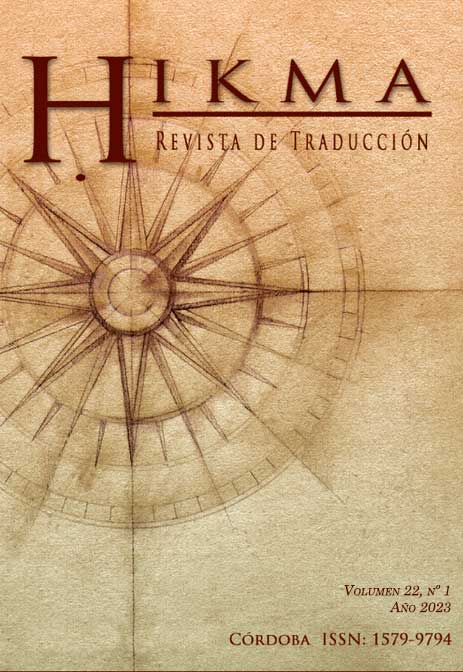Estudio del esfuerzo cognitivo en el procesamiento de características léxicas en estudiantes y expertos utilizando una metodología de seguimiento de ojos
Contenido principal del artículo
Resumen
El objetivo de este artículo es observar el impacto que la formación y la experiencia del traductor ejercen sobre diferentes grupos de participantes (principiantes, con formación y con experiencia) a la hora de evaluar una traducción. Para ello, mediremos el esfuerzo cognitivo empleado por estos en el procesamiento de características léxicas mediante la aplicación de una metodología de seguimiento de ojos. Se presentará a los participantes con una serie de versiones traducidas del inglés al español realizadas por traductores con distintos niveles de formación y experiencia. El artículo ofrece una descripción detallada del experimento llevado a cabo. En él, se puede observar que, además de detectar unos patrones comunes en los tres grupos, la formación y la experiencia han influido en su comportamiento a la hora de proceder con la lectura y la evaluación de las distintas versiones de traducción. Hemos podido observar un vínculo entre estos dos factores y la cantidad de esfuerzo cognitivo empleado, la cual es mayor en el grupo de estudiantes que en el grupo de expertos, siendo los participantes con formación los que registran un mayor esfuerzo, lo cual creemos que confirma el modelo de adquisición de destrezas propuesto por Dreyfus (2004). De la misma forma, la información extrínseca representa un elemento disruptivo que ha condicionado las decisiones de los participantes, la cantidad de esfuerzo cognitivo y cómo se han procesado las características léxicas.
Descargas
Detalles del artículo

Esta obra está bajo una licencia internacional Creative Commons Atribución-NoComercial-CompartirIgual 4.0.
Los/as autores/as que publican en esta revista aceptan las siguientes condiciones:
- Los/as autores/as conservan los derechos de autor y conceden a la revista el derecho de primera publicación con el trabajo simultáneamente bajo una Licencia de Atribución Creative Commons que permite a otros compartir el trabajo con un reconocimiento de la autoría del trabajo y la publicación inicial en esta revista.
- Los/as autores/as pueden llegar a acuerdos contractuales adicionales por separado para la distribución no exclusiva de la versión publicada del trabajo en la revista (por ejemplo, enviarlo a un repositorio institucional o publicarlo en un libro), con un reconocimiento de su publicación inicial en esta revista.
- Se permite y anima a los/as autores/as a publicar sus trabajos en línea (por ejemplo, en repositorios institucionales o en su sitio web) antes y durante el proceso de presentación, ya que puede dar lugar a intercambios productivos, así como a una citación más temprana y mayor del trabajo publicado (Véase El efecto del acceso abierto).

